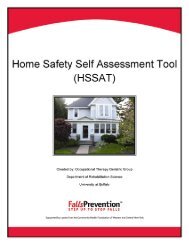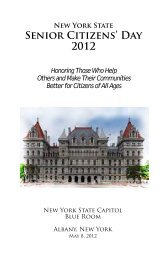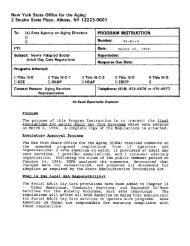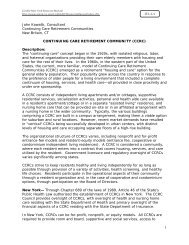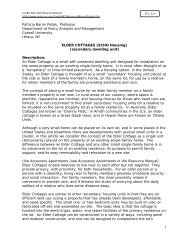Sustaining Informal Caregivers - New York State Office for the Aging
Sustaining Informal Caregivers - New York State Office for the Aging
Sustaining Informal Caregivers - New York State Office for the Aging
Create successful ePaper yourself
Turn your PDF publications into a flip-book with our unique Google optimized e-Paper software.
References<br />
Arno, P., Levine, C., & Memmott, M. (1999). The Economic Value of <strong>In<strong>for</strong>mal</strong> Caregiving<br />
Health Affairs, 18(2), 182-188.<br />
Caprio, T., Katz, P, Karuza, J, and Rehse, D. (2009). <strong>New</strong> <strong>York</strong> <strong>State</strong> Caregiver Services Survey:<br />
NY Connects Local Long Term Care Councils’ Assessment of Community Caregiver Support<br />
Services. Report to <strong>the</strong> <strong>New</strong> <strong>York</strong> <strong>State</strong> Family Caregiver Council. Finger Lakes Geriatric<br />
Education Center of Upstate <strong>New</strong> <strong>York</strong>: University of Rochester Medical Center, Rochester,<br />
NY.<br />
http://www.aging.ny.gov/Caregiving/Reports/Index.cfm.<br />
Evercare, (2007). Family <strong>Caregivers</strong> – What They Spend, What They Sacrifice: The Personal<br />
Financial Toll of Caring <strong>for</strong> a Loved One, access via internet:<br />
http://www.caregiving.org/data/Evercare_NAC_CaregiverCostStudyFINAL20111907.pdf<br />
Family Caregiver Alliance. (2008). Cali<strong>for</strong>nia <strong>Caregivers</strong>: A Profile, access via internet:<br />
http://www.caregiver.org/caregiver/jsp/content_node.jsp?nodeid=1961<br />
Fox-Grage W. & Gibson M. (2006) In-Brief: Ahead of <strong>the</strong> Curve: Emerging Trends and<br />
Practices in Family Caregiver Support. AARP Research Report.<br />
Gray, L. (2003). Caregiver Depression: A Growing Mental Health Concern, Policy Brief.<br />
Family Caregiver Alliance Brief.<br />
Haley,W., Levine, E., Brown. S., & Bartolucci, A. (1987). Stress, Appraisal, Coping, and<br />
Social Support as Predictors of Adaptational Outcome among Dementia <strong>Caregivers</strong>.<br />
Psychology and <strong>Aging</strong>, 2, 323-330.<br />
Health and Human Services and Assistant Secretary <strong>for</strong> Planning and Evaluation. (2003). The<br />
future supply of long-term care workers in relation to <strong>the</strong> aging baby boom generation. Report to<br />
Congress. Washington, DC.<br />
Houser, A., & Gibson M. (2008). Valuing <strong>the</strong> invaluable: <strong>the</strong> Economic value of Family<br />
caregiving, 2008 Update. AARP Research Report.<br />
Houser, A., & Gibson M. (2007). Valuing <strong>the</strong> Invaluable: A <strong>New</strong> Look at <strong>State</strong> Estimates of <strong>the</strong><br />
Economic Value of Family Caregiving (Data Update). AARP Research Report.<br />
Kiecolt-Glaser, J., Dura, J., Speicher, C., Trask, J., & Glaser, R. (1991). Spousal <strong>Caregivers</strong> of<br />
Dementia Victims: Longitudinal Changes in Immunity and Health. Psychosomatic Medicine, 53,<br />
345-362.<br />
Levine, C. (2006). <strong>New</strong> <strong>York</strong> <strong>State</strong> policy Agenda <strong>for</strong> Family <strong>Caregivers</strong>. Family and Health<br />
Care Project, United Hospital Fund.<br />
Mack, K. , Thompson, L. & Friedland R. (2001). Data Profiles, Family <strong>Caregivers</strong> of Older<br />
Persons: Adult Children. The Center on an <strong>Aging</strong> Society, Georgetown University<br />
22



